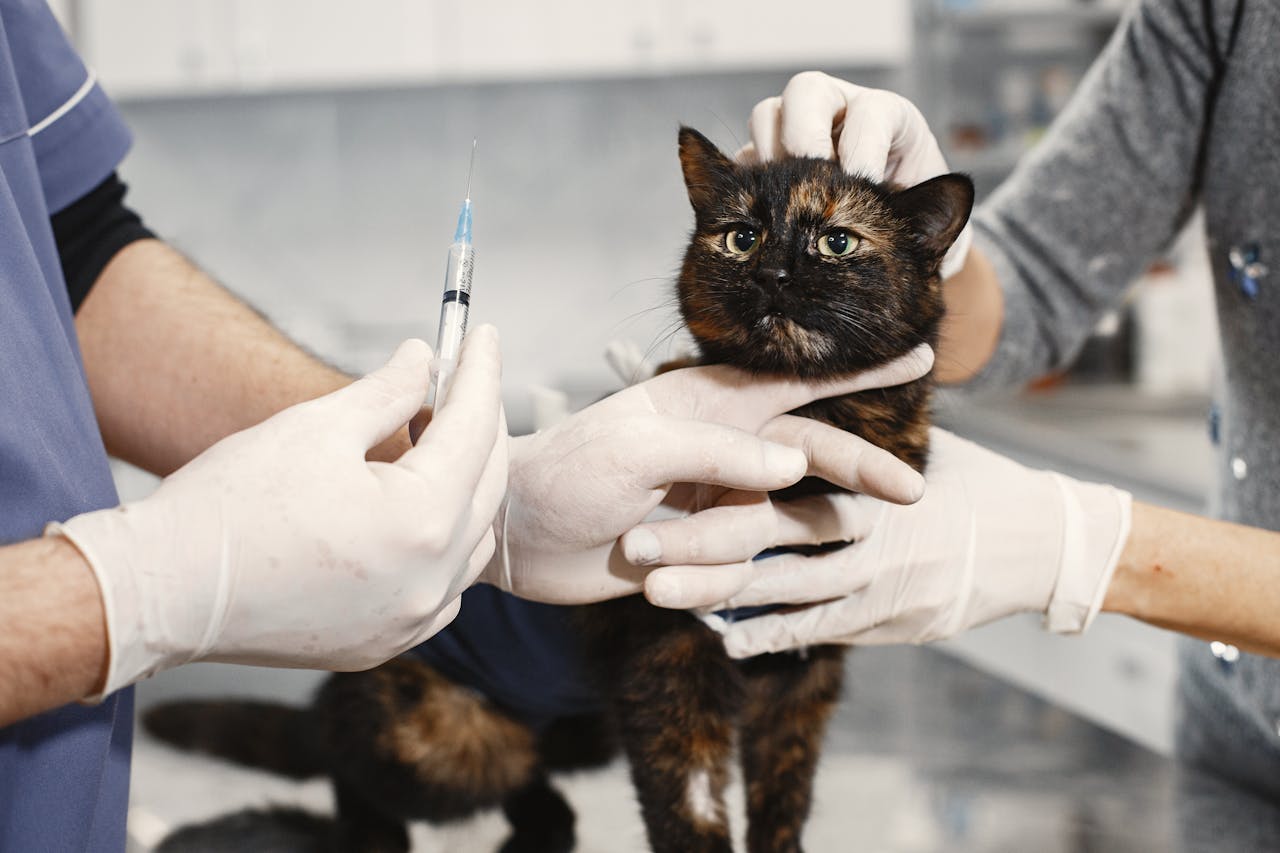
Our feline companions bring endless joy and purrs into our lives. As pet parents, ensuring their long-term health and happiness is our top priority. Vaccinations and parasite prevention form the cornerstone of preventive healthcare for cats, safeguarding them from serious diseases and pesky parasites.
Part 1: The Power of Vaccination
Vaccinations act like a shield, protecting your cat from highly contagious and potentially life-threatening illnesses. Just like us, cats develop immunity to specific diseases after exposure. Vaccines introduce a weakened or inactive form of the virus or bacteria, prompting the immune system to build defenses without causing actual illness. This prepares your cat to fight off future encounters with the real pathogen.
Core Vaccines for Cats:
FVRCP vaccine (Feline Viral Rhinotracheitis-Calicivirus-Panleukopenia):
A combination vaccine guarding against:
- Feline Viral Rhinotracheitis: Caused by a herpesvirus, this upper respiratory infection triggers sneezing, conjunctivitis, and fever.
- Feline Calicivirus: Another upper respiratory illness, it presents with similar symptoms to rhinotracheitis, and can sometimes cause mouth ulcers.
- Feline Panleukopenia (feline distemper): This highly contagious and potentially fatal disease attacks rapidly dividing cells in the body, leading to severe vomiting, diarrhea, and neurological issues.
Rabies vaccine:
Rabies is a deadly zoonotic disease, meaning it can be transmitted from animals to humans. The rabies virus affects the nervous system, causing disorientation, seizures, and ultimately death. Vaccination is crucial to protect both your cat and yourself.
Feline Leukemia vaccine (FeLV):
Feline leukemia virus (FeLV) suppresses the immune system, making cats susceptible to various secondary infections and certain cancers. While there is no cure for FeLV, vaccination can significantly reduce the risk of infection, especially recommended for cats with high exposure risk factors like spending time outdoors or living in multi-cat households.
Booster Shots and Additional Vaccinations:
Kittens require a series of initial vaccinations followed by boosters at specific intervals to maintain immunity. Your veterinarian will recommend a personalized vaccination schedule based on your cat’s age, lifestyle, and risk factors. For instance, indoor/outdoor cats may require additional vaccines against diseases like feline bordetella (kennel cough), a highly contagious upper respiratory infection commonly spread in shelters and boarding facilities.
Part 2: Parasite Prevention
Parasites, both internal and external, can affect your cat’s health. These unwelcome guests can cause discomfort, anemia, and even transmit diseases.
- Internal Parasites:
- Intestinal Worms: Roundworms, hookworms, and tapeworms are common internal parasites that reside in the intestines. Roundworms and hookworms can cause weight loss, diarrhea, and vomiting, especially in kittens. Tapeworms can irritate the anus, causing scooting. These parasites can also be transmitted to humans, particularly children.
- Heartworms: These serious parasites live in the heart and lungs, obstructing blood flow and causing difficulty breathing, coughing, and even death. Prevention is crucial as treatment is complex and expensive.
- External Parasites:
- Fleas: These tiny bloodsuckers cause intense itching and irritation, leading to skin inflammation and hair loss. Flea bites can also trigger allergic dermatitis in some cats. Fleas can also transmit tapeworm infections if ingested by your cat while grooming.
- Ticks: Ticks can attach to your cat while outdoors and feed on their blood. They can transmit various diseases, including Lyme disease (causing lameness, fever, and kidney problems) and babesiosis (leading to anemia, lethargy, and dark urine).
- Mites: Ear mites are microscopic parasites that burrow into the ear canal, causing intense itching, head shaking, and a dark, waxy discharge. Untreated ear mite infestations can become painful and lead to secondary infections.
Keeping Parasites at Bay:
Thankfully, a variety of parasite prevention medications are available, each with its advantages:
- Topical medications: Applied to the back of the neck monthly, these offer broad-spectrum protection against fleas, ticks, and sometimes heartworms. They are convenient and effective but may not be suitable for all cats, especially kittens or those with skin sensitivities.
- Oral medications: These chewable tablets are administered monthly and primarily target internal parasites like roundworms, hookworms, and tapeworms. Some formulations also offer protection against heartworms. Oral medications are a good option for cats who dislike topical treatments.
- Collars: Though less common, some collars provide continuous flea and tick control for several months. However, collars can irritate some cats’ skin and may not be as effective as other methods, especially against heartworms.
Year-Round Protection is Key:
Parasites can thrive year-round, even indoors. They can be brought in on shoes, clothing, or by other pets. Consistent parasite prevention, following the recommended schedule provided by your veterinarian, is crucial. Skipping doses can leave your cat vulnerable to reinfestation and potential health complications.
The Risks of Neglecting Parasite Prevention:
Leaving your cat unprotected exposes them to various health risks, including:
- Anemia: Heavy flea infestations or hookworm infections can cause significant blood loss, leading to weakness, pale gums, and difficulty breathing.
- Transmission of Diseases: Ticks can transmit Lyme disease and babesiosis, while fleas can transmit tapeworm infections. These diseases can cause serious health problems for your cat.
- Internal Parasite Infestations: Untreated intestinal worm infections can lead to weight loss, diarrhea, and vomiting, especially in kittens. Heartworm infections, if left unchecked, can be fatal.
Conclusion
Vaccinations and parasite prevention are essential for safeguarding your cat’s health and well-being. By scheduling regular vet checkups, keeping your cat up-to-date on vaccinations, and maintaining a consistent parasite prevention regimen, you can ensure your feline friend enjoys a long, healthy, and happy life. Want to learn more about caring for your furry friend? Check out our extensive library of articles on pet care, health, and training at PawPedia.
Remember: Consult your veterinarian to determine the most appropriate vaccination and parasite prevention plan for your cat’s individual needs. They will consider your cat’s age, lifestyle (indoor/outdoor), and any potential health risks to create a personalized healthcare plan. Early detection and prevention are key to keeping your cat healthy and happy for years to come.